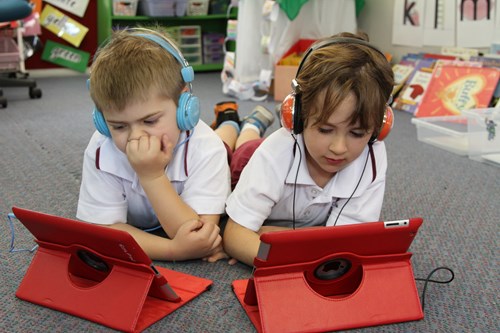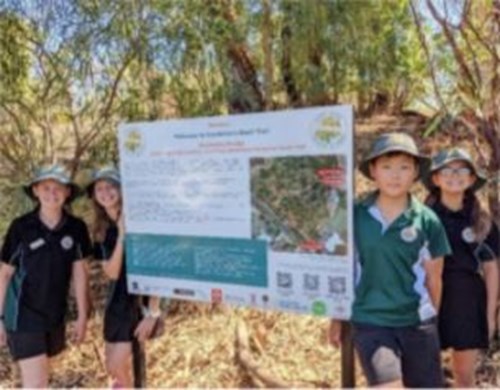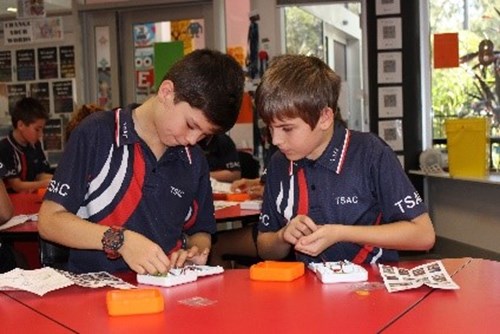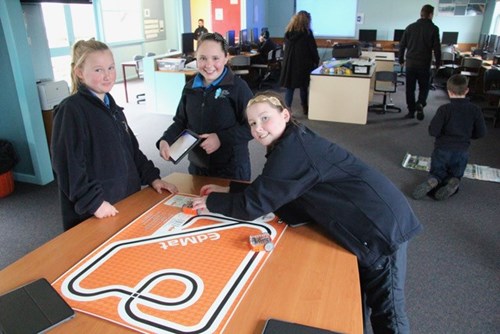The 160 low-ICSEA schools participating in the Digital Technologies in focus project are located in clusters around Australia.

Left to right: Melanie Hughes, Peter Lelong, Beth Claydon, Simon Collier, Martin Levins, Shane Byrne, Kim Vernon, Steve Grant, Deanne Poole, Mark McCarthy, Julie King and Sarah Atkins
Project lead
Julie King
Julie King, Project Lead, Digital Technologies in focus and Curriculum Specialist, Technologies, Australian Curriculum, Assessment and Reporting Authority (ACARA) is responsible for the Australian Curriculum: Technologies. Julie coordinated the development of the F–10 Australian Curriculum: Technologies. From 2015 to 2018 she was a Director of the Primary Industries Education Foundation Australia (PIEFA). Julie has previously worked as a teacher, distance education writer, curriculum adviser and manager for the New South Wales Department of Education.
Curriculum officers
Shane Byrne
Shane Byrne is responsible for three clusters in New South Wales (Dubbo, Newcastle and Sydney). After working for several years at Yew Chung International School in Shanghai, Shane joined ACARA. His experience includes teaching computer and information technology–related subjects within the New South Wales curriculum across primary and high schools, in the Catholic and public sectors. Shane also worked in tertiary education, teaching Computer Science and Business IT bachelor degree courses in the United Arab Emirates, as well as International Baccalaureate and IGCSE Computer Science courses in China. Throughout his teaching career, Shane has held a range of roles, each focusing on helping teaching staff to integrate digital technologies into their classroom pedagogy, including the New South Wales VET Train the Teacher program. Shane’s doctorate focused on the role integrators play in helping teachers to use technology to improve their practice and student learning outcomes.
Beth Claydon
Beth Claydon is responsible for supporting the north Queensland clusters of schools (Townsville, Cairns and Far North Queensland). Prior to this, Beth was a technologies senior project officer with the Queensland Curriculum and Assessment Authority. This role involved the creation of professional learning opportunities for not only the Technologies curriculum, but across all learning areas of the Australian Curriculum. Beth’s former teaching positions include teacher and Head of St Hilda’s@Home at St Hilda’s School, Gold Coast; John Paul College, Brisbane; and Featherby Junior School, UK. Beth is an Apple Distinguished Educator; she completed her Masters of Education, majoring in leadership and technologies implementation. She has developed a number of iTunes U-courses and co-authored a course for coding drones for primary students.
Simon Collier
Simon Collier, Curriculum Officer, Digital Technologies in focus, Australian Curriculum, Assessment and Reporting Authority (ACARA), is responsible for supporting clusters of schools across three states and territories, including Central Victoria, Murray River (New South Wales and Victoria) and Darwin (Northern Territory). Simon is an experienced school leader with a history working in primary and secondary schools across Victoria. He has worked as a teaching and learning leader and curriculum coordinator for 10 years, implementing school-wide and regional initiatives. Simon played a pivotal role in the Skilling the Bay – Digital Technologies project, providing professional teaching and support to both primary and secondary school teachers. Simon was employed by the Victorian Curriculum and Assessment Authority as a specialist teacher, supporting Victorian schools in implementing school-wide change and incorporation of the Digital Technologies curriculum.
Steve Grant
Steve Grant is supporting schools across three states and territories, including South Australia (Port Lincoln, North Adelaide and South Adelaide), the Northern Territory (Central Australia: Alice Springs and Yulara) and a cluster in the Australian Capital Territory. Steve is an experienced educator and school leader, having worked as a science teacher, head of learning area, and head of house. Before joining ACARA, Steve was a professional learning consultant with Scitech in Perth. He supported teachers and schools in urban, regional and remote locations, across primary, secondary, public, independent and Catholic education sectors. Steve has developed and presented a range of professional learning programs for teachers, school leaders, schools and school districts, with workshops in STEM, Science, Mathematics, Digital Technologies, Design and Technologies and project-based learning.
Sarah Atkins
Sarah Atkins is supporting school clusters in south-west Queensland and northern New South Wales. Previously, she was an assistant manager, Technologies, at the Queensland Department of Education, where she quality-assured the Curriculum into the Classroom Technologies teaching and learning resources. Sarah also oversaw the development of data-representation resources for the Queensland Coding Academy. She has previously worked as a specialist eLearning teacher at Good News Lutheran School and was successful in having the school named an Apple Distinguished School. Sarah sits on the board of the International Bebras Computational Thinking Challenge and is an editor of the Australian Bebras Teacher Solutions Guide. She was the chair of CSIRO’s Digital Careers Educators Advisory Committee for three years and was awarded the QSITE’s Outstanding Leader in 2015.
Martin Levins
Martin Levins is supporting schools in the New England area of New South Wales and the Northern Territory (Top End Remote). He is Immediate Past President of the Australian Council for Computers in Education (ACCE). Martin is considered a pioneer of internet use in K–12 education in Australia through his role of a director of information technology; he is a hands-on primary, secondary and tertiary educator. He has helped a generation of teachers and students through huge cultural changes of the technological revolution. Martin continues to play a leading role in strategic boards and committees. These include the ACCE, EduTech national conferences, Future-u.org and Day of STEM (Life Journey) advisory committees. He is also Australia’s affiliate representative to the International Society for Technology in Education (ISTE).
Peter Lelong
Peter Lelong is supporting two clusters of schools in Southern Tasmania and the north-west coast. Peter has been a Digital Technologies educator supporting all three jurisdictions in Tasmania for many years. He is an Apple Distinguished Educator (2004) and Google Educator (2015). Peter is also the Tasmanian project officer with Adelaide University, supporting the Computer Science Education Research Group Digital Technologies massive open online course. He is working to engage teachers in the implementation of the Digital Technologies curriculum throughout Tasmania. In recent years, Peter has worked to establish links between Indigenous students in the Northern Territory with their peers in Tasmania through the use of a range of digital technologies and communications initiatives, in a project that aimed to give students opportunities to learn more about each other’s communities and environments.
Deanne Poole
Deanne Poole is supporting school clusters in Western Australia (north Perth, south Perth, Geraldton and Kalgoorlie). Prior to this, Deanne was a Digital Technology specialist teacher and a Technology curriculum leader in a primary school. Her role included developing and leading professional development for educators across Western Australia. Deanne’s success in this role saw her invited to many educational events and conferences. Deanne has taught across multiple education sectors and is passionate about the educative integration of technologies across the curriculum. In 2013, Deanne was awarded a scholarship with Edith Cowan University Computer Science School to travel to India as part of a federally funded computer science tour. This experience gave her an opportunity to create professional connections with leaders in the Design and Technology education fields.
Kim Vernon
Kim Vernon is supporting schools in New South Wales clusters of Parkes and Eurobodalla. She is also Curriculum Specialist, Digital Technologies. Previously, Kim has held a position of Head of Integrated Technologies at the British International School in Singapore where she completed her Master of Education (Digital Technologies Leadership). Kim has extensive experience in the field of early childhood and primary education, specialising in digital technologies education. Originally from Sydney, Kim has gained valuable experience working in the UK and Singapore. Kim is passionate about change in technology, focusing on pedagogy and curriculum integration support. She has worked with leadership teams, teachers and students to support the introduction and inclusion of digital technologies and ICT across all areas and all year levels of the UK and Australian Curriculum.
Project officers
Melanie Hughes
Melanie Hughes supports the Digital Technologies in focus project across Australia in her role as Senior Project Officer. Melanie is an experienced primary and secondary educator having worked in the public and independent sectors in New South Wales and on a number of cross-sectoral educational technology projects and advisory committees. Melanie’s most recent role was as Education Consultant, Technology across the Curriculum with the Association of Independent Schools NSW, coordinating conferences including annual IT Integration (ICT as a general capability) and Digital Technologies/STEM conferences. Melanie has extensive experience in supporting educators through presenting, developing and delivering face-to-face and online professional learning in Design and Technologies, STEM, Digital Technologies and a wide range of other technology and related curriculum contexts.
Mark McCarthy
Mark McCarthy is the Project Officer for the Digital Technologies in focus team. He plays an integral role in supporting the team and steering committee, coordinating project administration and monitoring and reporting on project deliverables. Mark has a unique professional background with experience working as a primary teacher in Sydney and London in Catholic and government schools as well as coordinating professional learning in early education and care.
The Digital Technologies in focus (DTiF) project uses the key ideas of the curriculum as a driver for developing Technological pedagogical content knowledge (TPACK) and as a framework for change.
Participating schools in the three-year project will design and implement an action research project that addresses implementation of the Digital Technologies curriculum in their school.
School leaders are guided through the process of identifying areas they wish to improve and the support needed to make that improvement.
A key implementation strategy of the DTiF project is the development of a professional learning ecosystem to support schools to implement the curriculum and to increase sustainability of implementation. The figure below illustrates the ecosystem.

Project proposal
Each school involved in DTiF has completed a proposal for an action research project. The proposal states the school’s research question, the aims of the project and criteria for success. It outlines how the school will implement its project by identifying how data will be collected, the resources needed and risks, and by describing how the school will implement the Digital Technologies curriculum.
Project progress report 1
After the school has commenced its project, the teachers report back to the curriculum officer and other schools in their geographical cluster in a webinar. The school prepares a presentation where teachers outline their research question, project aims, what they have achieved so far and their next steps. They receive feedback from curriculum officers and other teachers in their cluster.
Project progress reports 2 and 4
During the second and fourth webinar progress reports, teachers comment on the changes they have made in their school. They explain why these changes have been made and the impact they have had on the implementation of the Digital Technologies curriculum. The teachers evaluate their strategies for data collection and their success against the criteria. Schools comment on the challenges they faced and on the outcomes of the project.
Project progress report 3 (mid-project report)
This report, presented via webinar, aims to capture progress on the research question and the school’s implementation plan. It will contribute to the final project report.
Final project report
At the end of the project the school team will complete a final report based on the Technologies processes and production skills strand (investigating and defining, generating and designing, producing and implementing, evaluating, and collaborating and managing). The final report will become an action research case study including student work samples. A representative sample of case studies will be published to assist other schools in implementing the Digital Technologies curriculum.
Evaluation of the DTiF project was based on 3 components:
- impact: success including sustainability within each participating school
- outcomes: including transferability of outcomes to schools outside the project
- methodology: including transferability to similar initiatives.
For each of these components there was a dual purpose. First, to confirm that the ‘people, processes and products’ were achieving results and to inform next steps; for example, clarifying professional learning needs. Second, the success of these components was measured to contribute to research on Technologies education and teacher professional learning, particularly for those working in disadvantaged schools. Evaluation of the project comprised an external evaluation conducted by a contractor, Deakin University, and internal evaluation conducted by ACARA staff.
Internal evaluation
The Leading Curriculum Change Using an Ecosystem Approach: Digital Technologies in focus: Supporting implementation of Digital Technologies evaluation report (June 2021) reports on ACARA’s National Innovation and Science Agenda funded project for the period June 2016 to June 2021. This report is highly relevant to those with an interest in Digital Technologies curriculum specifically, as well as to those with an interest in influencing curriculum change in disadvantaged schools and seeking to maximise the impact of teacher professional learning.
The internal evaluation was coordinated by the project lead and project officer from 2017 to 2021. The research methodology used a mixed-methods approach. Data sources comprised teacher surveys, teacher self-assessment matrices, student assessments, professional learning workshop evaluations, reports and reflections.
External evaluation
Deakin University was contracted to complete an external evaluation of the project from 2018–2020. The evaluation focused on six schools from four states and territories as a representative sample of all jurisdictions. The evaluation gathered qualitative data to create rich case study accounts of each school's engagement in the project and the impacts and outcomes. Two reports were produced, a progress report and a final report. The reports are authored by Julianne Lynch, Glenn Auld, Anne Cloonan, Joanne O’Mara, and Christopher Speldewinde. In addition, four printable resources were developed to highlight considerations when planning Digital Technologies implementation.
Printable resources
External evaluation - findings on a page
Supporting Digital Technologies curriculum in schools



